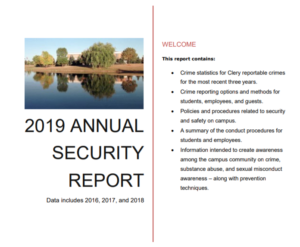 Campus security reports are typically out by this time of year, though 2020 has changed that.
Campus security reports are typically out by this time of year, though 2020 has changed that.
Because of the COVID-19 pandemic, the Department of Education has extended the deadline for the Clery Report from Oct. 1 to Dec. 31.
Laura Egan, senior director of programs at the Clery Center, said the Clery Report is an annual security report that colleges receiving Title IV federal funding are required to publish each year, as established by the Clery Act.
After the rape and murder of Jeanne Clery in her college dormitory, her parents worked to create a standard for reporting crimes on campus. They lobbied for policy change that eventually created the Clery Act, signed in 1990.
Egan said the Department of Education enforces the Clery Act while the Clery Center, a national nonprofit organization, partners with institutions of higher education to provide training and support in understanding the act’s requirements and increasing safety on campus.
“This report promotes transparency and accountability between the institution and its campus community members on how the institution prevents and responds to violence on campus,” Egan said.
She said the extension will be beneficial for colleges who have encountered challenges because of the pandemic. Such possible challenges include difficulty contacting local law enforcement for responses to reported crimes and dealing with faculty leaves of absence or layoffs as a direct result of COVID-19.
“I think it’s appropriate in light of what’s occurring with COVID,” said President Kojo Quartey. “This is a year unlike any other.”
This year, Suzanne Wetzel, vice president of Administration, is responsible for documenting any crime that has occurred on campus. Wetzel declined to comment due to preoccupation with other work.
Quartey said the vice president of Enrollment Management and Student Success would typically be handling the Clery Report.

However, current VP of Enrollment Management and Student Success, Scott Behrens, arrived at MCCC this fall. As a result, Behrens said he is still working on training in that area, but he may be involved in the future.
Quartey said he has no concerns about the Clery Report. He expects it to be cleaner than usual due to the shift from on-campus to digital classes, clubs and activities.
Egan said while it is hard to predict how the pandemic will affect the report, in-person crime reports may go down, while instances of cyber-stalking have the potential to increase. Reports of crime may also be more delayed.
“With the millage funds here on campus, with the renovations and additional security cameras we’re adding, it is less likely for any illicit activities to occur,” Quartey said. “We are going to have a safer and more secure campus now more than ever thanks to the citizens in the community who voted for the millage.”
MCCC’s Clery Reports have reported no crimes in each category for three consecutive years.
“It is not uncommon for a campus’s Clery crime statistics to be zeroes, especially as the Clery crime statistics reflect a very specific data set: reports of incidents that meet the definition of Clery crimes, that occurred within the institution’s Clery geography, and were reported to a campus security authority,” Egan said.
According to the Department of Public Safety, on-campus incidents of criminal homicide, sexual assault, robbery, aggravated assault, arson, hate crimes, domestic violence, dating violence and stalking are all considered reportable Clery crimes.
More details about Clery crimes and definitions can be found here: https://dps.usc.edu/alerts/clery/crime-definitions.
To access more information about campus safety, go to https://www.monroeccc.edu/safety.
To provide an anonymous tip or report, visit https://www.monroeccc.edu/anonymous-tip.
To contact the Campus Security Office call (734) 457-6007. For after hours, call the Campus Security Mobile number at (734) 735-9401. If it is an emergency, call 911.

